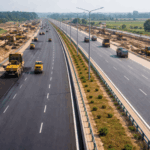Proptech innovations shaping real estate 2.0: A comprehensive overview
by Pushpender Singh, Managing Director, JMS Group
In a significant transformation of India's real estate sector, the fusion of cutting-edge technology and property transactions, commonly known as ‘Proptech’, is reshaping the way Indians buy, sell and manage properties. The role of technology in the real estate industry has expanded dramatically in recent years as it is transforming the way we buy, sell and manage real estate properties. As technology continues to evolve, its impact on the industry is becoming increasingly significant. Not to forget, proptech has immense potential to revolutionise the real estate landscape in India.
Artificial Intelligence in property valuation
Artificial intelligence (AI) is playing a pivotal role in property valuation in India. Using predictive analysis algorithms, AI assesses various factors such as demographics, income distribution and future supply forecasts within micro markets. This empowers decision-makers to make informed choices when it comes to property investments. AI-driven property valuation not only enhances accuracy but also expedites the decision-making process.
Digital property marketplaces
One of the most prominent Proptech innovations in India is the emergence of digital property marketplaces. These online platforms connect buyers, sellers, renters and investors in a seamless and efficient manner. Real estate marketplaces have become instrumental in democratizing access to property listings. Buyers can explore properties, view images, access market data and even schedule virtual tours, making the property search process more convenient and inclusive.
Virtual and augmented reality
Virtual Reality (VR) and Augmented Reality (AR) technologies are transforming the way properties are showcased in India. Through VR, prospective buyers can take immersive virtual tours of properties from the comfort of their homes, reducing the need for physical visits and saving time. AR apps allow users to visualize how furniture and decor would fit into a space, making it easier for them to envision themselves living there. These technologies not only enhance the buying experience but also contribute to reducing the friction in property transactions.
Blockchain for secure transactions
Blockchain technology provides a decentralised and secure way to track the ownership and transfer of real estate assets in India. Blockchain-based real estate transactions can reduce the time and costs associated with traditional real estate transactions and also increase transparency and security. This innovation has the potential to significantly reduce fraudulent activities and disputes in property transactions
Government initiatives
To encourage the widespread adoption of technology in the real estate sector, the Indian government has launched initiatives, such as the Technology Sub-Mission (TSM) under the Pradhan Mantri Awas Yojana-Urban (PMAY-U). This program promotes the use of innovative, eco-friendly and disaster-resistant technologies in affordable housing construction. These initiatives not only promote sustainable practices but also stimulate technological advancements in the construction and real estate sectors.
Data-driven customer insights
Another significant impact of technology on real estate in India is the ability to collect and preserve customer data. With the help of modern software tools and Customer Relationship Management (CRM) systems in place, real estate developers collect, store and analyze customer data to gain insights into their preferences, buying behaviour and feedback. This information can be used to optimize sales strategies and improve the overall customer experience, leading to more satisfied customers and increased sales efficiency.
As India's real estate market continues to expand, it becomes more and more obvious that technology is the main driver of this incredible transformation. Convenience, efficiency and customised experiences serve as the cornerstone upon which real estate's optimistic future is built in the emerging future. The growth of Proptech is a glaring example of how technology and real estate have significantly converged, providing property aficionados across the nation with a more hopeful, approachable and personalised future.
















